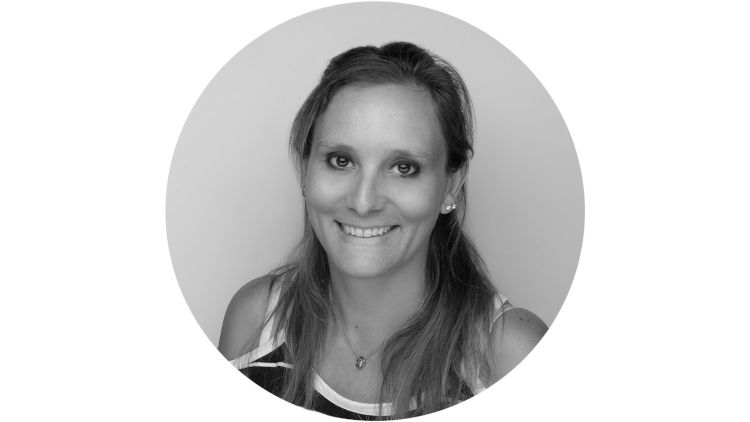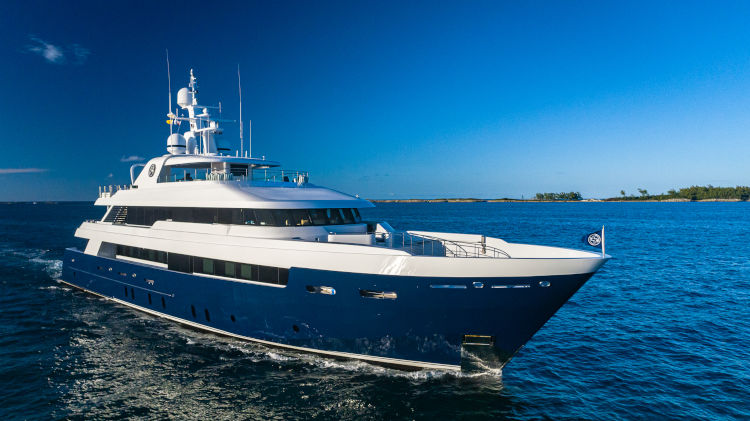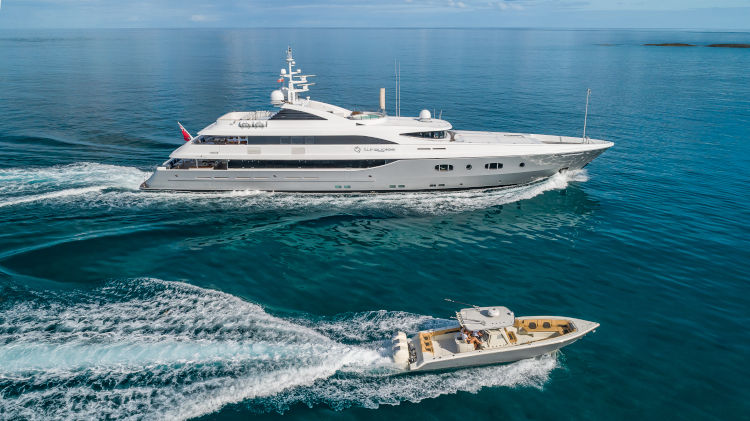Celine Robins, founder and president of One-To-One, has joined IYC as the company’s Director of Yacht Management Global Operations. With the inclusion of One-To-One’s yacht clientele, the IYC Yacht Management Portfolio more than doubled.
There is a reason for this, as Celine’s background combines two unique educational tracks: one, experience in yachting, having acquired her captain’s license at 18, and two, a unique IT background. After graduating from La Sorbonne University in Paris, France, Celine received a full grant for an MBA at Clark University in Worcester, MA, specializing in Finance and IT. Later, she studied Entrepreneurship at Wharton School of the University of Pennsylvania, in Philadelphia, PA.
In 2018, Celine developed an innovative top-of-the-line yacht management tool that organizes and covers every aspect of the yacht management experience – finance, crew management, and tech support. She integrated the concept into her One-To-One Yacht Management Company.

Now, she brings her team, insight, expertise, and extensive list of yachting clients to the already successful IYC. The addition of Celine and her team to the global IYC team will facilitate a step change within IYC, creating the potential to double its yacht management division business within 2022-2023.
The SherpaReport discussed this new phase of Celine’s yacht management career with Celine herself.
SherpaReport: Before integrating into IYC, you founded a Yacht Management Firm called One-To-One. What was the meaning of your company name?
Celine: The concept was that we had a one-to-one relationship with the owner; they were not just a number. The relationship between the yacht manager and the owner is very personalized. Many owners call me on a daily basis. I wanted them to understand how important they were, so I named the company to reflect the special, unique relationship we had with them.
SherpaReport: When did you first hear of IYC and why did you feel you could work with them?
Celine: I have known Mathilde De Roffignac, the Managing Director of the IYC Monaco office for several years. Our paths were crossing on a regular basis as IYC was charter manager on several yachts I managed; they also kept selling many of the boats I had under management.
When you are an independent YM company, you work with everyone, and see all the files. Yet, the IYC files were always the best: fast, organized, concise, efficient.
Then one day, Mathilde called me and said I was invited to meet with the CEO of IYC to discuss how we could work more together. I met with Stefanos and that day was a revelation. As we opened our trade secrets to each other, we realized how similar our methods and viewpoints and goals were. Are.

SherpaReport: In your experience, is yacht management easier, less time-intense with yachts that are chartered or yachts that are privately owned?
Celine: Charter boats are probably easier, just because everything is regulated. When a yacht is run as a business, rules are rules and everyone follows them. Private boats, by contrast, are less regulated, so we in yacht management, must be the regulator. That is why my preference is to run private boats to the standards of the commercial ones.
SherpaReport: In the IYC press release, it was said that “A yacht is a business.” Have you encountered yacht owners and charterers who think differently? Does one think of yachting as more of a business than the other?
Celine: Owners always think of a yacht as a business. They are very often successful business people and they have that mindset, and so do we. Charterers though, they are on vacation and for them, it is definitely pleasure only.
SherpaReport: It would seem, like you said, that many feel that yachting is a happy lifestyle. But it is more than this! Do you think that much of yacht management is yacht education?
Celine: Yes! a large part of the job is guidance. After 17 years in this industry, I like to think that owners, in particular first-time owners, rely on industry experts like myself, and the team here at IYC to make the right decisions. They know and we know that knowledge of fueling, VAT, and all things technical saves money for owners. I always say that good managers more than pay for themselves.
SherpaReport: What dimension of yacht management is most complex – crew/finance/safety/technical?
Celine: Every part of yacht management is highly complex. Each of these is very specialized. And it is actually very rare to find people who have a good grasp of all of these.
Crew managers must know all the ins-and-outs of employing crew of all nationalities, on any flag state, in any country. (In a regular business, you only need to know – usually-- how to employ people in one state, in one office.)
For CSOs (Chief Security Officers) and DPAs (Designated Persons Ashore) they must know every safety regulation that applies to the yacht; create procedures and checklists, specific to that yacht.
And, in finance: we produce financial reports in the same way a CFO does, in a large company. In every country, we manage VAT, sales tax, county tax, state tax, federal tax, European countries’ social taxes. Thus, we must know the accounting principles and language nuances for many different countries.

SherpaReport: What competitive differentiators did One-To-One have that separated your yacht management from others, and that you brought with you to IYC?
Celine:
# 1 is Our reporting
My childhood friend does hotel management for the Dubai Investment Fund. She is a Columbia University MBA graduate. She oversees some of the most prestigious hotels in the world. She does exactly what I do: she is the liaison between the hotel owner and the operator, just like I am between the yacht owner and the crew.
While on vacation at my house, she was generating her monthly reports to the owner. And this was my revelation. No one in yachting had ever produced a report even remotely close to what they were doing for these hotels.
Thus, One-To-One monthly reports were born. These reports go over each aspect of yacht management that we handle for the owner.
#2: Our software
I created my first yacht management software back in 2009. I called it Seanergy and programmed it myself to help me manage the 12 Rodriguez Group yachts I was caring for. Instead of using Excel sheets to organize all expiration dates, maintenance tasks, etc; I plugged it all into my software.
In 2018, when I opened One-To-One, I redeployed Seanergy. But coding fades quickly. So I programmed a new App. And week after week, the App was doing more and more - almost becoming a virtual yacht manager. This app allowed my team and I to triple the number of boats a regular yacht management company could handle.
#3: The people
I am very lucky; my team is just fantastic. This coupled with the staff at IYC. With the technology and the intelligent, highly reactive, and knowledgeable staff we are set up for short and deep long-term success.
SherpaReport: A process question: a new yacht owner, who comes to you, where do you start? Talk us through the whole process.
Celine: This is easy! What does the new owner need to focus on first?
The money. The first question is usually: "Give me a budget. How much will it cost?" And, what do owners find most surprising about yacht management? The regulatory part.
Usually when I make a presentation and we arrive at the Safety and Security section, they are very surprised in how much is involved in safety: the emergency manuals, the contingency plans, the garbage management plan, the check lists, the muster list, the drills, the schedule of drills, etc. They often had not realized how much goes into safety.
SherpaReport: When do clients typically approach you - before they have bought a boat or after purchase? and does it make a difference?
Celine: There are two key moments when people hire us:
First, they just accepted their yacht and are closing shortly, and second, they have owned the yacht for a while but are in trouble and need help. We are there in both cases.
SherpaReport: What have been the most significant changes in yacht management over the last few years? and what changes do you foresee over the next few years?
Celine: Actually, I was seeing no change. I think many companies that do yacht management amongst other things, only use yacht management to have a steady income.
My approach, which entirely matches IYCs, is that yacht management is a complicated profession, and that focus brings great added value to clients and captains. Not only are we an added value financially, but we also bring them peace of mind, by protecting them against liability.
SherpaReport: What is the most challenging part of your role and what is the most rewarding?
Celine: The most challenging is probably related to the ideal and the real: some may think that being a crew member is the dream job that pays well, allows you to travel around the world, where you get a year-long tan; but the reality is very different.
Crew members live, eat and work in confined spaces, constantly together. So, behind the scenes, human issues often emerge and sometimes problems arise. Although owners do not see these, we do and we deal with these daily.
The most rewarding for me is succeeding in helping people: finding the marina spot when there was none; saving them money through contacts; and at the end, see them resell the boat for a larger one; barely with any depreciation because we took such good care of the boat being sold.

